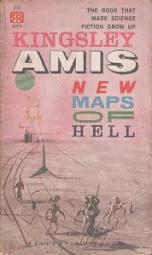
New Maps of Hell
Kingsley Amis
141 pages, including index
published in 1961
One of the cultural myths of science fiction fandom is that literary writers look down on the genre, that mainstream writers don't understand science fiction and mainstream critics are disdainful of it. If they find an science fiction book they like, they explain it's too good to really be science fiction, or so the myth goes.
Like most myths, this one has a kernel of truth in it. Science fiction, because of its birth in the pulp magazines, was often looked down upon; even now there are plenty of people who think it childish or escapist. But this is not the whole truth and never was. There have always been mainstream writers enamoured of science fiction, as well as mainstream critics who understood the genre. Kingsley Amis was one of them and New Maps of Hell was one of the first results of his fascination with science fiction. Later on he would also become an editor of a several series of science fiction anthologies, as well as write science fiction himself.
It's funny, but this makes the second non fiction book I've read by Kingsley Amis, without having read any of his fiction. Must rectify that someday. In the meantime, I've quite enjoyed his non-fiction writing, his book reviews and more general articles on literature in What Became of Jane Austen? as well as this book on science fiction.
New Maps of Hell evolved from a series of lectures Amis gave at Princeton University in 1959. It is basically a broad overview of the then current state of the field for people with little or no experience of science fiction. Reading it today, it's more a historical curiosity than any sort of useful guide to science fiction. Science fiction has grown too much and grown up too much. Rooted in the short story, it is now a genre where the novel is as general as in most other genres, a genre in which the writing is just as good as that of socalled mainstream literature and which devotees no longer need to be ashamed off.
The sort of ambivalence with which Amis reats science fiction, both defending it as a worthwhile genre in its own right and simultaneously qualifying it as a superior form of popular culture, but not of real literature is no longer needed and reads very old fashioned. Still, his heart is in the right place.
As a piece of history, this is a book every serious science fiction reader interested in the field's evolution should own. As anything else, it's too dated to be of use.